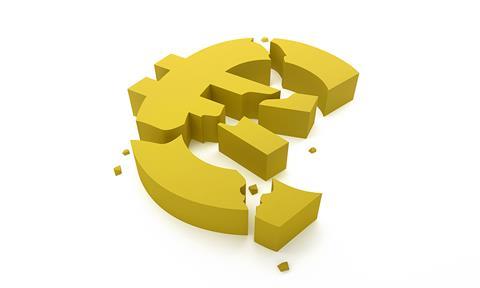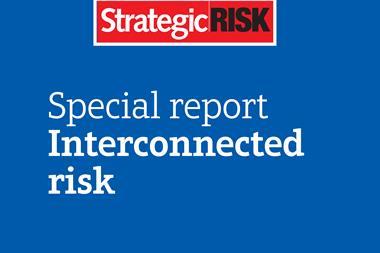What happens if the eurozone breaks up in 2012? And what does this mean for corporate risk managers

In December last year the UK’s Financial Services Authority asked British banks to prepare for one or more European countries leaving the Euro or the single currency collapsing altogether. And in January the chief risk officer’s of all of Britain’s “systemically important” banks were asked to attend a roundtable to discuss the fallout from such a scenario.
Other alarming signs, such as France’s credit rating downgrade and the International Monetary Fund’s refusal to extend lending support to Greece, have increased fears over the eurozone’s future.
But how exactly would a eurozone breakup play out? And how would it affect corporate risk managers?
Exclusive Analysis outlined a “plausible scenario”, in which Greece withdraws from the Euro in 2012, to try and help businesses understand the impact of a breakup. Here’s what they say could happen:
- After April elections the Greek government might be unable to secure bailout funds, having missed austerity and reform targets. In this case, Greece would need to announce its withdrawal from the eurozone, closing its banking sector and freezing current accounts
- In response, German and French governments could nationalise their banks, which are most exposed to Greek sovereign debt, consequently increasing their own national debt. This would lead to a new round of credit rating downgrades
- In the face of this scenario Italy would likely suspend its debt repayments.Prime Minister Monti’s administration would then collapse
- While the European Central Bank would aim to work with eurozone governments to protect the banking sector, Europe’s leaders would be unable to agree on policies to protect themselves from the contagion
- Portugal and Spain, unable to access emergency bailout funds, would follow Greece and Italy by suspending their repayments
- Soon European politics would begin to polarise and become more nationalistic. Other nations could withdraw from the eurozone and impose protectionist measures
So the big banks have already started to think about what would happen if the Euro ceases to exist. But they are not the only ones.
The biggest threat to UK companies in 2012 is a breakup of the Euro, according to Deloitte’s fourth quarter survey of 94 CFOs from FTSE100 and FTSE250 sized companies (see chart above).
A third of them attach a 37% probability to one of more members of the single currency leaving the Euro in 2012. One survey respondent summed up the concerns of his peers when he wrote that the biggest risk in 2012 was a “eurozone collapse sparking a second credit crunch”.
Extreme risks, like the breakup of the Euro, are by their nature hard to hedge against, because the impact is so far-reaching
Fears over the eurozone crisis are naturally shared by corporate risk managers. “The big risk in front of us right now is economic risk,” says one UK risk manager from a FTSE100 sized business. “Sovereign debt is a crisis for global organisations.”
The biggest challenge, he says, is trying to find ways of growing your business when economic forecasts are so intrinsically uncertain. “The challenge is how do you stay ahead of the curve and how do you stay in control of your business.”
In a report at the end of last year Towers Watson described the breakup of the Euro as an “extreme risk”, but it obviously still figured it was one worth mentioning in some detail.
According to Towers Watson, leaving the Euro would be painful and entail losses for someone. That “someone” is likely to include foreign investors or institutions holding Greek debt.
“We believe that the Vienna Convention on the Law of Treaties allows a withdrawing country to redenominate all internal debt and all sovereign debt (including sovereign debt held by foreigners) in the new domestic currency. This would impose losses on foreign lenders. Private debt held by foreigners would be more difficult and probably decided by long drawn-out legal cases,” said Towers Watson’s report.
Extreme risks, like the breakup of the Euro, are by their nature are hard to hedge against, because the impact is so far-reaching. There are some strategies, though. Investors seeking to hedge against the break-up of the euro might try and use credit default swaps (CDS), for example, but these can also introduce different types of risk.
It may even be possible to draw parallels with similar financial crises in the past, such as when Argentina unpegged the peso from the US dollar
The first step for most companies will be to think about how a scenario like this could affect their business. Provided they understand that they will be able to plan appropriate actions to take.
It may even be possible to draw parallels with similar financial crises in the past, such as when Argentina unpegged the peso from the US dollar in 2001, leading to massive devaluation.
Here’s an IMF report on lessons learned from the crisis in Argentina.
Never forget that amidst all this turmoil there could be opportunities. Weaknesses in the economy could provide opportunities for cash rich companies to acquire assets at low valuations. And weaker competition provides companies on the right footing to expand their market share. Meanwhile, if you’re hiring, a weak jobs market could provide the chance to acquire more skilled staff.




















No comments yet